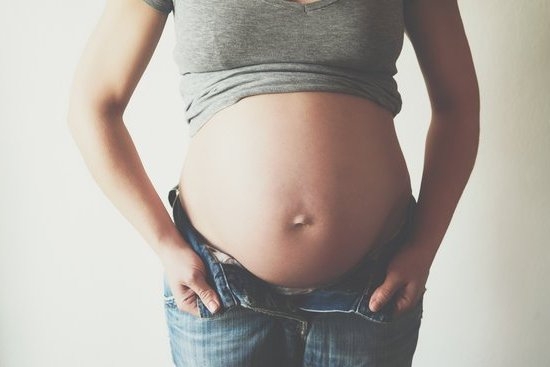Experiencing back pain during pregnancy is a common concern for many expectant mothers, leading them to question: is back pain a sign of pregnancy? Understanding the various symptoms and signs associated with pregnancy is crucial for expectant mothers, and back pain is often a significant indicator.
From hormonal changes to alterations in posture and weight distribution, there are several factors that can contribute to back pain during pregnancy. In this article, we will delve into the relationship between pregnancy and back pain, exploring the potential causes, impact on the body, and practical tips for finding relief.
Pregnancy brings about numerous changes in a woman’s body, both physically and hormonally. These changes can often result in discomforts such as morning sickness, fatigue, and in some cases, back pain. As such, it’s essential to be well-informed about the various signs and symptoms of pregnancy to ensure a healthy and comfortable experience for both the mother-to-be and the baby.
In addition to addressing common symptoms of pregnancy, focusing on potential indicators such as back pain can provide valuable insights into what expectant mothers may experience throughout their journey. By understanding how back pain can manifest during pregnancy, individuals can take proactive steps toward managing discomfort and seeking appropriate medical assistance when necessary. Let’s explore the connection between pregnancy and back pain in further detail to better understand this important aspect of maternal health.
Understanding Back Pain
During pregnancy, many women experience back pain as part of the physical changes their bodies go through to accommodate the growing fetus. It is normal to experience some degree of discomfort in the back during pregnancy, but severe or persistent pain should not be ignored, as it could be a sign of an underlying medical issue. Understanding the different types and causes of back pain during pregnancy is essential for proper management and relief.
The most common type of back pain experienced during pregnancy is lower back pain, which is often related to the changing biomechanics of the body. As the uterus expands and shifts its position, it can put pressure on the lower back and pelvis, leading to discomfort. Additionally, the hormonal changes that occur during pregnancy can loosen the ligaments and joints in the pelvic area, contributing to instability and potential pain.
It’s important to note that not all back pain during pregnancy is purely mechanical; certain conditions such as sciatica, pelvic girdle pain, and round ligament pain can also manifest as back pain. Sciatica occurs when there is pressure on the sciatic nerve, causing radiating pain down one or both legs. Pelvic girdle pain affects the pelvic joints and can cause significant discomfort in the lower back, hips, and thighs.
Round ligament pain produces sharp or jabbing sensations in the lower abdomen or groin area that may radiate into your pelvis or low back. Recognizing these specific manifestations of back pain during pregnancy is crucial for seeking appropriate treatment and relief.
Hormonal Changes
During pregnancy, hormonal changes play a significant role in the way the body responds and adapts to the growing fetus. The surge in hormones such as progesterone and relaxin is essential for maintaining a healthy pregnancy, but it also has implications for musculoskeletal health. These hormonal changes can lead to increased flexibility in the joints and ligaments, which can affect posture and spinal alignment, ultimately contributing to back pain.
One of the main hormones responsible for these changes is relaxin, which is produced by the corpus luteum and later by the placenta during pregnancy. Relaxin is essential for preparing the body for childbirth by loosening ligaments in the pelvis to allow for easier delivery. However, it also affects other joints and ligaments throughout the body, increasing their flexibility and potentially leading to instability in the spine.
Another impact of hormonal changes during pregnancy on back pain is related to weight gain. As the baby grows, there is added pressure on the spine and pelvis, which can result in discomfort and pain.
The combination of increased flexibility due to hormonal changes and additional weight can put strain on the lower back, causing aches and discomfort. It is important for expectant mothers to be aware of these hormonal influences on musculoskeletal health as they navigate through their pregnancy journey.
- Relaxin production leads to increased flexibility in joints and ligaments
- Weight gain during pregnancy puts added pressure on the spine
- Awareness of hormonal influences can help expectant mothers understand and manage back pain
Changes in Posture
During pregnancy, a woman’s body undergoes significant changes to accommodate the growing fetus. These changes can have a profound impact on posture and weight distribution, often leading to back pain. Understanding how these alterations affect the body can help expectant mothers manage and alleviate discomfort associated with back pain.
Postural Changes
As the baby grows, the mother’s center of gravity shifts forward, causing her to compensate by leaning backward. This adjustment places increased pressure on the lower back, potentially resulting in discomfort and pain. Additionally, the expansion of the abdomen can cause the curvature of the spine to increase, further contributing to back strain.
Weight Distribution
The natural progression of pregnancy involves weight gain as the baby develops. This additional weight places added stress on the spine and supporting muscles, potentially leading to musculoskeletal issues such as lumbar pain. The redistribution of weight in the pelvic region can also alter posture and exacerbate existing back problems or contribute to new ones.
Alleviating Discomfort
To mitigate back pain caused by postural changes and weight distribution during pregnancy, it is essential for expectant mothers to be mindful of their posture. Practicing good body mechanics, such as standing tall with shoulders back and avoiding prolonged periods of sitting or standing, can help alleviate strain on the back. Engaging in exercises that strengthen core muscles and improve flexibility can also provide relief from discomfort.
Overall, understanding how changes in posture and weight distribution during pregnancy can lead to back pain is crucial for expectant mothers. By implementing strategies to support spinal health and seeking guidance from healthcare professionals when necessary, women can minimize discomfort and promote overall wellness throughout their pregnancy journey.
Pregnancy-Related Conditions
During pregnancy, a woman’s body undergoes significant changes that can lead to various discomforts and pains, with back pain being one of the most common symptoms experienced. However, it is important to recognize that not all back pain during pregnancy is the same. In fact, there are specific pregnancy-related conditions that can manifest as back pain, including sciatica, pelvic girdle pain, and round ligament pain.
Sciatica
One of the pregnancy-related conditions that can cause back pain is sciatica. This condition occurs when the sciatic nerve, which runs from the lower back down to the legs, becomes compressed or irritated.
The pressure on the nerve can result in sharp shooting pains in the lower back, buttocks, or down one leg. During pregnancy, as the uterus grows and puts pressure on the pelvis and lower back, it can exacerbate existing sciatic nerve issues or cause new ones to develop.
Pelvic Girdle Pain
Pelvic girdle pain (PGP) is another condition that is commonly associated with back pain during pregnancy. This type of pain typically occurs around the sacroiliac joints in the pelvis but can also radiate into the lower back and hips. PGP is often caused by increased movement and instability of these joints due to hormonal changes during pregnancy. As a result, pregnant women may experience difficulty walking, climbing stairs, or even turning over in bed due to pelvic girdle pain.
Round Ligament Pain
Round ligament pain is characterized by a sharp or stabbing sensation felt on one or both sides of the lower abdomen or groin area. This type of discomfort occurs as a result of stretching and thinning of the ligaments that support the uterus as it grows during pregnancy.
The round ligaments attach from the front part of the womb up into your groin at either side before passing through your pelvic region into your middle section where they meet up with muscle fibers known as cremasteric muscles inside an area referred to as inguinal canal.
Tips for Relief
During pregnancy, many women experience back pain as a result of the physical and hormonal changes that the body undergoes. The added weight, shifted center of gravity, and hormone-induced loosening of ligaments can all contribute to discomfort in the back. However, there are several ways to manage and alleviate this pain.
One effective way to relieve back pain during pregnancy is through regular exercise. Low-impact activities such as walking, swimming, and prenatal yoga can help strengthen the muscles that support the back and improve overall posture. Additionally, specific exercises targeting the core and pelvic floor can provide stability and reduce strain on the lower back. It is important to consult with a healthcare provider before starting any new exercise routine during pregnancy.
Incorporating stretching into daily routines can also help alleviate back pain. Gentle stretches that focus on the lower back, hips, and thighs can promote flexibility and reduce muscle tension. Prenatal massage or seeing a chiropractor who specializes in treating pregnant women can also provide relief from back discomfort. Furthermore, ensuring proper posture while sitting, standing, and sleeping can help prevent or minimize back pain.
Making lifestyle adjustments is another crucial aspect of managing back pain during pregnancy. Wearing supportive footwear, avoiding high heels, using a pregnancy pillow for proper alignment while sleeping, and practicing good body mechanics when lifting objects are all important habits to adopt for reducing strain on the back.
You May Insert an Example HTML Table Correctly Within Your Response
| Tips for Relief | Benefits |
|---|---|
| Regular exercise | Strengthens muscles supporting the back; improves posture |
| Stretching | Promotes flexibility; reduces muscle tension |
| Lifestyle adjustments | Reduces strain on the back; promotes proper alignment |
When to Seek Medical Help
During pregnancy, back pain is a common occurrence for many women. However, it is important to be aware of the red flags and warning signs that could indicate a more serious issue and necessitate medical evaluation and treatment. While mild back discomfort is expected during pregnancy due to the physical changes the body undergoes, persistent or severe pain should not be ignored.
One of the key red flags to watch out for is back pain accompanied by other symptoms such as fever, chills, or loss of bladder or bowel control. These could be indicators of a more serious condition such as an infection or nerve compression, which require immediate medical attention.
Additionally, if the back pain is sudden and sharp, especially in the lower back and pelvis, it could suggest issues like preterm labor or a urinary tract infection that may impact the pregnancy.
Another important warning sign is if the back pain extends down one or both legs and is accompanied by tingling, numbness, or weakness. This combination of symptoms could indicate sciatica, a condition where the sciatic nerve becomes compressed, leading to radiating pain and discomfort. Additionally, any trauma or injury to the back during pregnancy should also be promptly evaluated by a healthcare provider to ensure proper care and management.
Conclusion
In conclusion, it is evident that back pain is indeed a common sign of pregnancy. However, it is crucial for expectant mothers to stay informed about the different types and causes of back pain during pregnancy. Hormonal changes, shifts in posture and weight distribution, as well as specific pregnancy-related conditions such as sciatica or pelvic girdle pain, can all contribute to back pain during this time. Understanding these factors can help women better manage and alleviate their discomfort.
Furthermore, seeking medical advice is paramount for any concerns about back pain during pregnancy. While some level of discomfort is common, there are red flags such as persistent or severe pain, numbness or tingling in the lower extremities, or bladder or bowel dysfunction that should prompt immediate medical attention. It is important for pregnant women to work closely with their healthcare provider to ensure a safe and healthy pregnancy.
Ultimately, by staying informed about the potential causes of back pain in pregnancy and being proactive in seeking medical support when necessary, expectant mothers can navigate this aspect of their prenatal journey more effectively. With the right knowledge and guidance from healthcare professionals, managing back pain during pregnancy can be made more manageable, allowing women to focus on the excitement and joy of expecting a new addition to their family.
Frequently Asked Questions
What Does Early Pregnancy Back Pain Feel Like?
Early pregnancy back pain can feel like a dull ache or sharp, stabbing sensation in the lower back. This discomfort may be constant or intermittent, and can also radiate down to the hips and buttocks.
What Symptoms Do You Have at 1 Week Pregnant?
At 1 week pregnant, symptoms can be very subtle, if present at all. Some women may experience mild cramping or spotting as the fertilized egg implants in the uterus. However, most women will not notice any symptoms at this early stage.
Is Back Pain a Sign of Pregnancy Before Period?
Yes, back pain can be a sign of pregnancy before a missed period. Hormonal changes and the physical strain of early pregnancy can lead to lower back pain even before a woman realizes she is pregnant. This discomfort is often attributed to the preparation of the body for the growth and expansion of the uterus.

Welcome to my fertility blog. This is a space where I will be sharing my experiences as I navigate through the world of fertility treatments, as well as provide information and resources about fertility and pregnancy.





